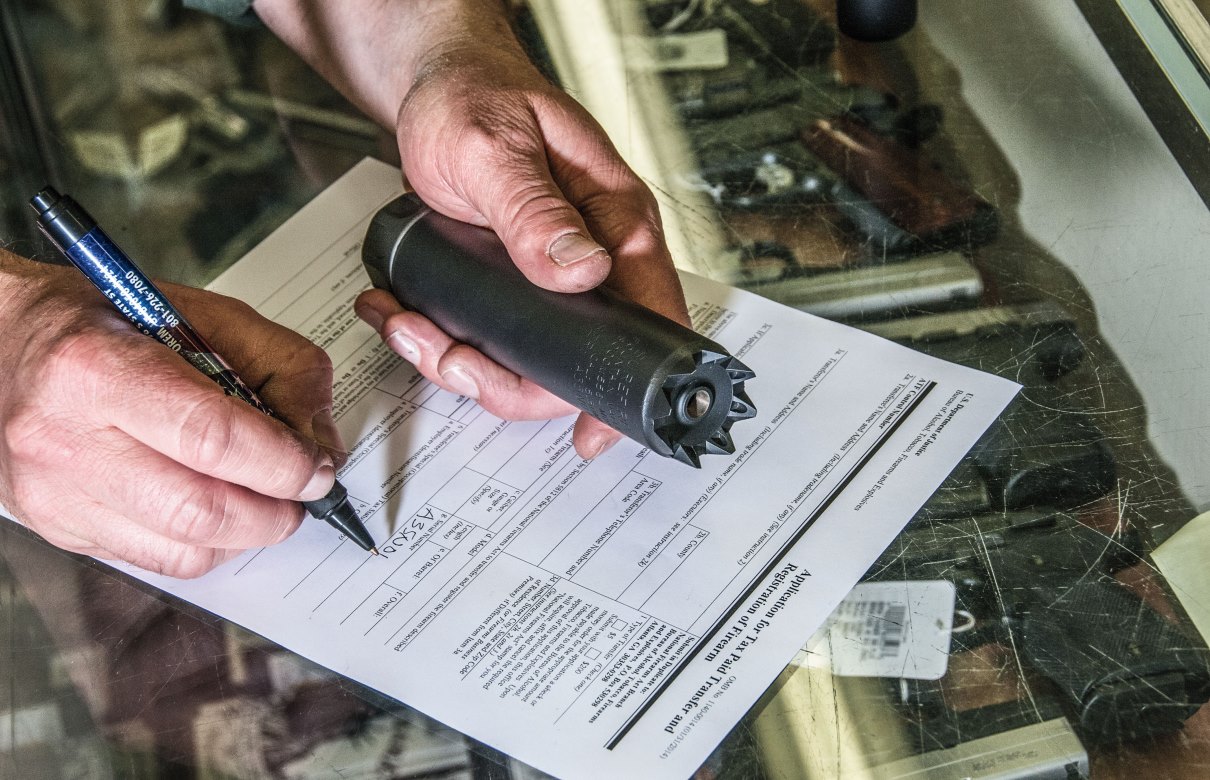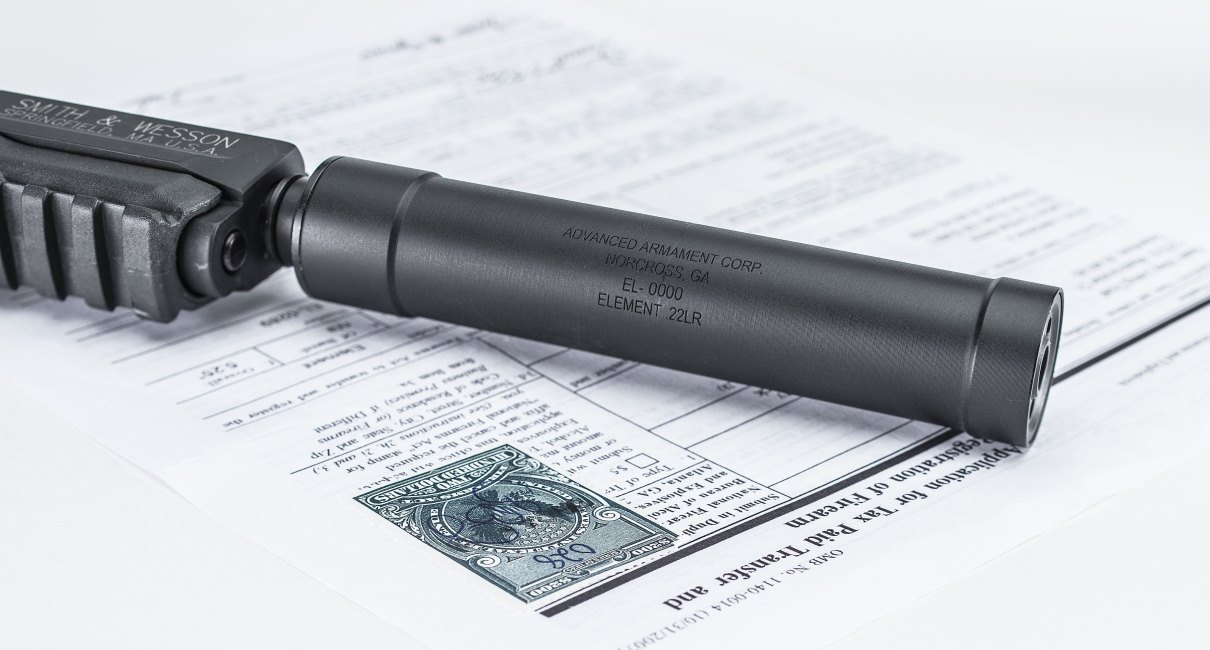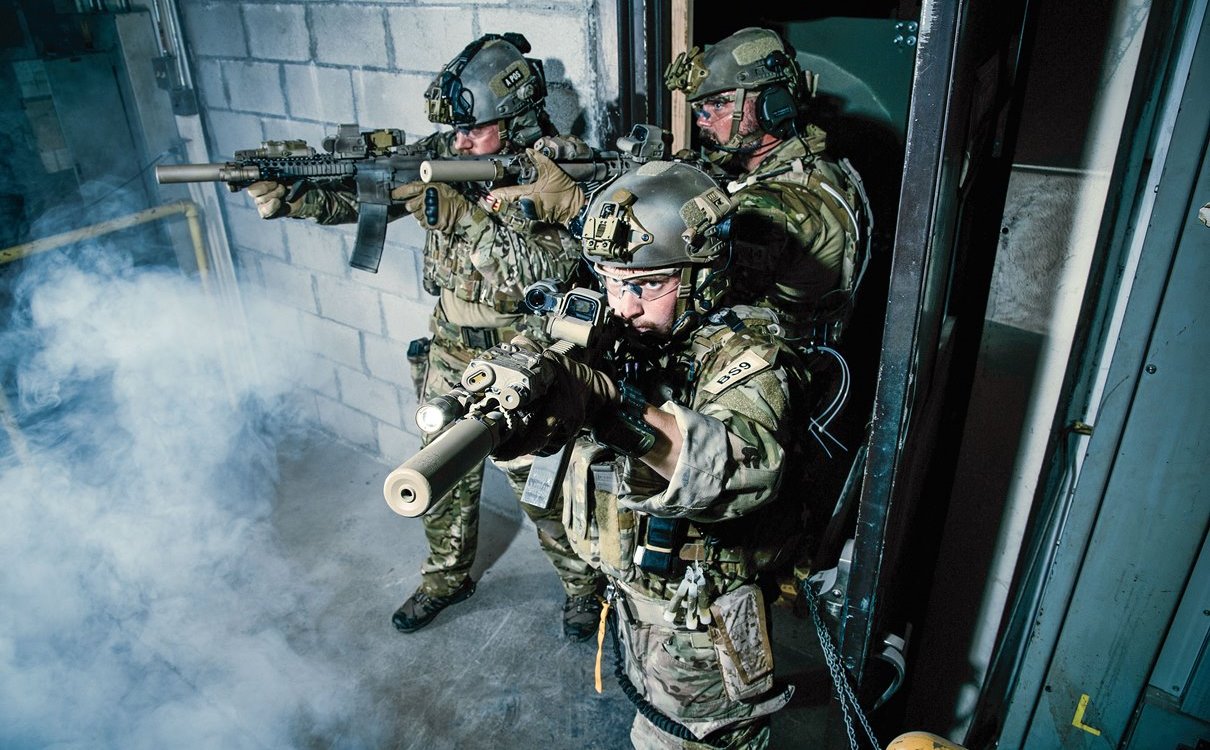Trust Your Silencer
By: Joseph von Benedikt
 When purchasing a silencer or other NFA regulated item, putting it in a trust instead of purchasing it as an individual offers noteworthy advantages: You don't need fingerprint cards, the police chief's signature or passport-quality photos; and the time required to process your paperwork is usually considerably less. (Photo courtesy of "Shooting Times")
When purchasing a silencer or other NFA regulated item, putting it in a trust instead of purchasing it as an individual offers noteworthy advantages: You don't need fingerprint cards, the police chief's signature or passport-quality photos; and the time required to process your paperwork is usually considerably less. (Photo courtesy of "Shooting Times")
Purchase your muzzle-muffler the easy way
According to a survey at the 2014 NRA show by SilencerCo – a Utah-based company producing cutting-edge, U.S.-built silencers – 85 percent of people asked don’t know that silencers are often legal.
Well, they are, at least according to federal law. A few of the more restrictive states don’t allow them, or if they do, it’s only under special circumstances. However, far and away the greater portion of dear old America does indeed allow silencers. I’d name the benevolent states, but the list would be much too long. Instead, note the sidebar graphic detailing which states don’t allow them.
States where silencers are illegal:
- California
- Delaware
- Hawaii
- Illinois
- Iowa
- Massachusetts
- New Jersey
- New York
- Rhode Island
- Vermont
- Washington D.C (not a state)
Don’t get me wrong: Even in the most firearm/suppressor-friendly states, one can’t just waltz into the corner hardware store and pick up a silencer with the weekend’s spending money. It goes without saying that you have to be in good legal standing. If a felony prevents you from owning a gun, you can’t own a silencer. Also, you must be a legal resident to purchase a silencer in the United States.
According to the Bureau of Alcohol, Tobacco, Firearms and Explosives (BATFE) website, federal regulations require that you be 21 years or older to purchase one, fill out two copies of the BATFE Form 4, pay a $200 tax, submit two passport-quality photographs and two fingerprint cards, and get your local police chief’s approving signature on your paperwork.
That’s a lot of hoops to jump through. When you add to that the fact that wait times on paperwork can be lengthy, obtaining a silencer becomes a pretty burdensome process. To some folks it’s not worth it for a metal tube to screw on the end of your gun barrel to make it a little quieter, not when foam earplugs can be had for pennies, and immediately.

After all your hard work and waiting, this suppressor shows up in the mail releasing your suppressor from BATFE purgatory. (Sean Utley photo)
There’s an easier way: Set up a simple NFA firearms trust, and purchase the silencer using it. That’s not to say that purchasing a silencer under a trust is entirely painless, but it’s a vast improvement over buying a silencer as an individual. Plus, the trust gives you and your family long-term legal advantages and protection, which I’ll explain in a bit.
First, the why of a trust, then we’ll look at how to set one up. When you’ve got a trust, you’ll still have to pay the $200 tax, and you’ll submit a copy of your trust along with the two copies of the BATFE Form 4, but you don’t have to get passport photos, fingerprints or the head constable’s signature. According to SilencerCo’s spokesperson, trust-related paperwork tends to get through the approval process in half the time, so you should have your suppressor in three to six months.
In addition to being easier to set up, a trust protects you, your family and any friends you choose to add as trustees as well as the future of the silencer itself. You see, when you as an individual own a silencer, you are the only one legally allowed to possess it. In other words, if you leave it in your pickup and your wife gets pulled over while driving it, she can be charged with felony possession of an NFA (National Firearms Act)-protected item. Plus, when you pass away, the silencer becomes an unowned piece of NFA-protected equipment and will most likely be confiscated by the BATFE.
When it’s purchased under a trust, however, any trustee you choose to name – your wife, your brother or your uncle Waldo – can legally possess the silencer. When you pass away, it legally transfers to whomever you’ve named as your beneficiary or beneficiaries. No fuss, no muss.
So, where to get started setting up a trust? Gun shops licensed to sell Class 3 items such as silencers, SBRs and fully automatic firearms can often recommend a local attorney versed in NFA firearm trusts. Price and the pain involved in getting it completed vary from firm to firm, but cost usually runs $400 and up.
Silencer purchasing tips:
If purchasing as an individual:
- Complete BATFE FORM 5330.20 (certificate confirming U.S. citizenship).
- Obtain your local sheriff's or police chief's signature on both Form 4s.
- Obtain two fingerprint cards.
- Obtain two passport photos for your form 5330.20.
- Supply a check for $200.
- Submit all to the BATFE.
If purchasing through an NFA Firearms Trust:
- Supply a check for $200.
- Submit a copy of your trust, both Form 4s and the check to the BATFE.
There’s a simpler way: SilencerCo offers a $130 service called EasyTrust wherein you click on a link (silencerco.com/nfa-trust/), fill in and print the provided forms, and get them ratified. Done.
While the trust is legal in all states, the process of ratifying it can differ. For instance, in my home state of Utah, getting the completed form notarized ratifies it.
According to the instructions available on the EasyTrust website, a few states – including Alaska, Colorado, Hawaii, Idaho, Michigan, Missouri and North Dakota – require that the trust be recorded at a courthouse. Other states, such as Utah, require only that it be notarized (Alabama, California, Delaware, Florida, New York and Louisiana require that the notarization be witnessed).
It’s confusing, but although the trust itself is 50-state legal, that doesn’t mean that owning a silencer is. While you may legally complete the EasyTrust process and have the NFA firearms trust in restrictive states, unfortunately individual state law can prevent you from purchasing a silencer.
Shopping tips:
- Locate a Class 3 dealer in your area.
- Shop for and choose a silencer.
- Pay a deposit (since silencers are assigned by serial numbers, the dealer may require that you pay for the product in full).
- Fill out two BATFE Form 4s, including the serial number on your silencer.
While in the EasyTrust process, the site allows entry of up to eight trustees. After it’s completed, you can add or remove trustees through notarized amendments (an amendment form is included as part of the EasyTrust documents). You can also add your existing NFA items, should you already own any, to the trust. However, since you’re transferring the item from personal ownership to the trust, you’ll have to pay the $200 tax.
Children can’t be added as trustees, but they can be added as beneficiaries. However, according to SilencerCo’s booklet “Yes, Silencers Are Legal,” as long as your kid is 18 years of age, he or she can be added as a trustee, which enables legal possession. To purchase a silencer from a dealer, you’ve got to be 21, so a trust basically gains your kid three years of legal suppressor use, although it’s worth noting that “Yes, Silencers Are Legal” states that an individual of 18 years may purchase a silencer from another individual with a Form 4 transfer as long as state laws allow it.
Trustees must be legally qualified to own a suppressor; you can’t add your wayward brother-in-law who just got out of prison or an individual who’s been adjudicated mentally unstable.
Interestingly, you can add individuals who live in a different state, including states that don’t allow silencers. While the trust doesn’t make it legal to possess the silencer(s) in the trust while in an NFA-unfriendly state, trustees may possess it in states where NFA-item ownership is legal. And yes, you can take your silencer across state lines, as long as both states allow silencers. As pointed out by SilencerCo’s EasyTrust website, when considering trustees, ask yourself whom you’ve given the combination of your gun safe to and whom you trust to use your firearms without you present. Those same individuals are probably good candidates to be trustees on your NFA firearms trust.
To protect your family members from potential legal action should they be found driving a vehicle in which you’ve left your silencer, those of legal age should be included on the trust – to a point. This becomes a bit of a ticklish situation, but if you have family members, whether an impulsive but legal young adult or your feisty old great-aunt, whom you don’t really trust to use your firearms, you’ll want to carefully consider whether you want to offer them legal possession of your silencer.
As for beneficiaries, you must enter at least one, and you’re better off entering a couple. Most times, a spouse makes the sensible first beneficiary, with a trusted other family member or close friend as a second option.
As mentioned above, changes can be made to your NFA firearms trust through amendments. You can add or remove trustees, change your children from beneficiaries to trustees as they come of legal age (18) or make other adjustments.
According to SilencerCo’s website, to make a change, you write up the change(s); rename the document as Amendment 1, Amendment 2, etc.; print it out; and have it notarized. Critically, SilencerCo recommends noting at the end of each amendment that “The trust continues from original date of creation” to confirm that all preceding information is still relevant.
I’m likely preaching to the choir here, but in wrapping up, it’s worth taking a look at the advantages of a silencer. Perhaps most critically, the use of a silencer protects hearing. The delicate mechanisms of the inner ear are some of the few parts of the body that do not heal; damage is permanent. Every shot you fire without hearing protection causes irreversible damage. Earplugs and muffs are great, but without argument, a silencer is the most effective hearing protection available. It protects the ears of all within hearing, and it’s never forgotten at home. Plus, it doesn’t interfere with the shooter’s normal hearing – a very important consideration for hunters, home protectors, law enforcement officers and armed forces members.
That last advantage can’t be overemphasized. Hunters often don’t use hearing protection because it interferes with their ability to hunt. Every time they shoot in the field, they damage their ears. Homeowners defending hearth and family rarely have time to insert ear protection and shouldn’t even if they do have time; being able to hear the intruder trumps protecting one’s ears. If you’ve ever fired a gun in an indoor range, you know how much more aggressive the sound of the contained blast is; a silencer is the only viable option available to home protectors.
The same holds true with law enforcement officers and armed forces troops but with even greater emphasis. Such personnel are often placed in situations in which the ability to hear small sounds becomes critical, and they’re far more likely to exchange gunfire within the confines of a room than civilians are.

(Surefire photo)
In short, a silencer allows you to maintain ultimate situational awareness, even while shooting, without risking irreparable loss of hearing. If the difficulty of obtaining a silencer has you on the fence, do yourself a favor and create a simple NFA firearms trust. It makes the process of purchasing the ultimate hearing protection a lot more palatable.
Editor’s Note: This article isn’t meant to be used as legal advice. You should seek the counsel of an attorney in your state with questions concerning specific laws.